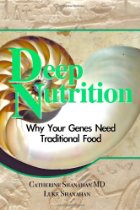Currently Reading – Deep Nutrition: Why Your Genes Need Traditional Food
Today, I’ve been immersed in Deep Nutrition by Catherine Shanahan MD, a former low-fatter who once believed she knew everything there was to know about diet and nutrition. That is, until she discovered Weston A. Price, arguably the greatest nutrition pioneer who ever lived.
A page-turner indeed, it was actually a short sidebar on page 12 regarding the Hippocratic Oath that struck a chord with me. As most of us know, our medical professionals take this oath on their graduation day. However, most have a limited knowledge as to what the oath truly means.
Believed to have been written by Hippocrates or by one of his students, the Oath begins:
“I swear by Apollo the physician, and Aesculpius, and Hygieia, and Panacea, and all the gods and goddesses, that, according to my ability and judgment, I will keep this Oath and this stipulation . . .”
The Greek god Apollo is sure to ring a bell, but who are these other mysterious characters?
Devout believers in the laws of balance, the ancient Greeks understood true health and wellness to rest upon two complementary ideas. The first is Hygieia, the goddess of health.
By name alone, one may assume that Hygieia solely embodies the concept of general hygiene and cleanliness. However, she symbolizes the application of sound nutrition principles throughout one’s life, as well as successive generations, in order to ensure the proper building of healthy bodies. Such nutritional practices were intended for all phases of life, including prenatal, childhood, adolescence, and adulthood. Certainly, the proper time for nourishment is any time. Abiding by Hygieia’s decree was recognized as the most effective means of preventive medicine. How easily she has been forgotten.
Aesculpius, the god of medicine, typifies the indispensable knowledge of surgical procedures and remedies. Working with the tools of Panacea (the god of potions and cure-alls), Aesculpius comes to the rescue when nutrition fails, accidents happen, or infections set in.
Surely without Hygieia, there would be no health. And without Aesculpius, there would be no means of recovering health once it falters. The two work in synergy, balancing the feminine with the masculine.
Medicine has lost its roots, electing to abandon the feminine while adopting a hypermasculinized approach to wellness. The building of the body through Hygienic means has become an afterthought. Balance is no longer present. And when such imbalance is present, the inescapable result is chaos and disorder, thus the state of health in the modern industrialized world.
To swear an oath is to declare a truth. Hippocrates’ words represent the ultimate truth in the pursuit of health and sound medicine. Unfortunately, many who raise their right hands and swear this oath have no idea what it stands for. In turn, they have no idea what they stand for. This is the plight of our broken medical system, a system uncertain of the foundation on which it stands.
Medicine needs its woman back.
Sean Croxton
Just a Guy Gettin’ His Blog On…
www.undergroundwellness.com


Love it! I work at an Osteopathic hospital. D.O.’s have a holistic approach built into their education, but even they need get back to their roots.
I am a fan of your radio. Thanks for spreading the word!
One administrator trying to help medicine get its woman back!
Cheers,
Richard
looks like a great book and thanks for tying in the Greek. Glad Richard mentioned the DO’s approach because indeed their are many clinicians that are doing a great job at including a foundation of cleanliness and nutritional knowledge to their teaching. lets not forget that within the “broken medical system” their are nutritionist and wellness personal that faulter and are miss lead in their ways. and with that professor that conducted himself on the Twinkies and Doritos diet, we still have lots to learn about nutrition and the foundation of properly teaching it.
It is no mistake that in all ancient philiosophies I have studied, the daily “health building” is regarded as feminine. Yin (TCM) and Ida (Ayurveda) are both slow but steady feminine energies in the subtle body. I am not surprised they are taken for granted because unlike their counterparts, they do not become acutely deranged. We are slowly awakening in the Western world that this important balance of health building and acute care is the only way to administer a healthcare system. The only problem is, there is nobody qualified within the system to coach wellness-building. The best we have right now is the doctor paying lip service to exercise and nagging the patient about their diet.
Thanks Sean for recommending Deep Nutrition. I would have finished it in one sitting if I could have somehow taken 10 hours off from being a mom. I loved how she connected genetics to nutrition, especially the emphasis that our genetics are not our fate and how real nutrition – or lack of it – guides our genes. Awesome book!!
I’m looking at getting this book. Hopefully, if I ask nicely, Santa will be kind! 😀